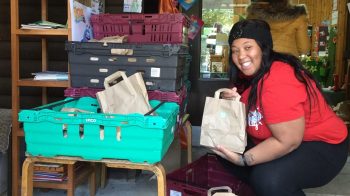Charity in a down economy
Share Now on:
Charity in a down economy
Kai Ryssdal: It’s worth noting that everybody is experiencing this economy differently. Some are doing all right, others are struggling. And you just heard, some can give, others can’t.
That’s led to a lot less for charities, even those that’ve seen the need for their services rise. The other day we went back to a place we first visited in the fall of 2008, when the hard times were just digging in: The Los Angeles Boys & Girls Club. Last time we were there, executive director Juana Lambert was trying to figure out how to get a baseball field built in a recession. Here’s part of that tape.
Juana Lambert: I’m going to try and build this field, economy or no economy.
And now:
Coach: Nice hit, Nice. Go home mija, go home. Good job, good job, stay right there. OK, batter up.
Ryssdal: Look at that you’ve got lights and everything?
Lambert: We’ve got lights and everything.
Ryssdal: Oh man.
Lambert: We’ve got our new Dodger Dreamfield score board.
Ryssdal: No I’m sorry, this is crazy! This is great.
Seems like things are good. The new field and the scoreboard are great. But as we walk inside, there’s something else new from three years ago too.
Ryssdal: Man, look at this: We got cauliflower, canned goods, peanut butter I guess. Man, look at all this stuff. Onions, bags and bags of onions.
It’s a food bank.
Richard Renteria: That means we’re going to put one in each bag, because we do about 90 bags. Let me get you some bags.
Richard Renteria’s in charge, sorting canned goods and fresh vegetables into plastic grocery bags.
Renteria: When we started, we were doing 45 families. Within a couple of weeks, we started doing 80 and now we’re up to 90.
Ryssdal: And how long have you been doing this?
Renteria: For a year, for a year now.
When I finally caught up with Juana Lambert — she’s always on the move — I asked her: A year and a half after the recession officially ended, how things are going.
Lambert: We’ve seen almost a 40 percent reduction in private funding.
Ryssdal: Wow.
Lambert: Over the last year or so. So that’s really scary because I think I’m really good at bringing in money.
And remember, this is the Boys & Girls Club, a heavy-hitter in the world of not-for profits. So if she’s feeling it, so too are a lot of others who do social services.
Lambert: I think foundations are struggling with the amount of money they’re giving out. I think the trend is they want to do volunteer service and in-kind donations first, and then if you past the test, they will give you funding.
Ryssdal: Your bar is higher then.
Lambert: The bar is higher, the bar is tougher and the bar is longer to get the money.
Ryssdal: Is this, do you think, the new normal? When we were here in 2008, you were like yeah there’s going to be a recession but things will get better. And here we are, three years later.
Lambert: Well what I think I said to you before was we don’t have a choice, we have to move forward. But I have to admit, I’m a little more frightened at the way things are going. We serve the working poor, and the group that we serve are people who are really struggling and feeling the economy, with reduced hours, reduced benefits, reduced employment.
Kira Prado gets this, she has three kids.
Kira Prado: Kiara 11, Edgar 7, Hector 4.
Kiara and Edgar come to Boys & Girls Club after school. Kira helps out at the food bank while they’re here. And she’s got a night job, cleaning a mini mall in Chinatown. I asked her how much she makes.
Prado: $150 for quince dias.
Ryssdal: That can’t be every 15 days. $150, that’s $10 a day.
As the economy tries to recover, Juana Lambert figures she’ll see more families like Kira’s, but she does wonder whether there’ll be any more resources to help them.
Lambert: I don’t know if I’ve really been clear on how I think the struggle is much more difficult now. I’m always positive about bringing in the money but I’m really concerned.
There’s a lot happening in the world. Through it all, Marketplace is here for you.
You rely on Marketplace to break down the world’s events and tell you how it affects you in a fact-based, approachable way. We rely on your financial support to keep making that possible.
Your donation today powers the independent journalism that you rely on. For just $5/month, you can help sustain Marketplace so we can keep reporting on the things that matter to you.


















